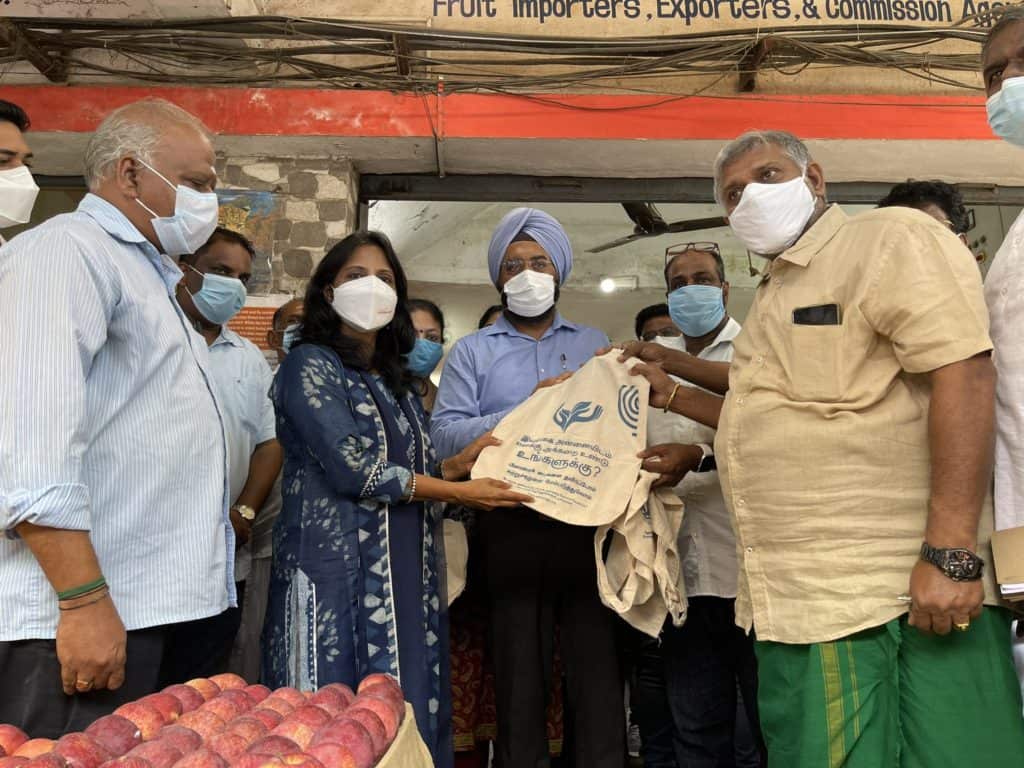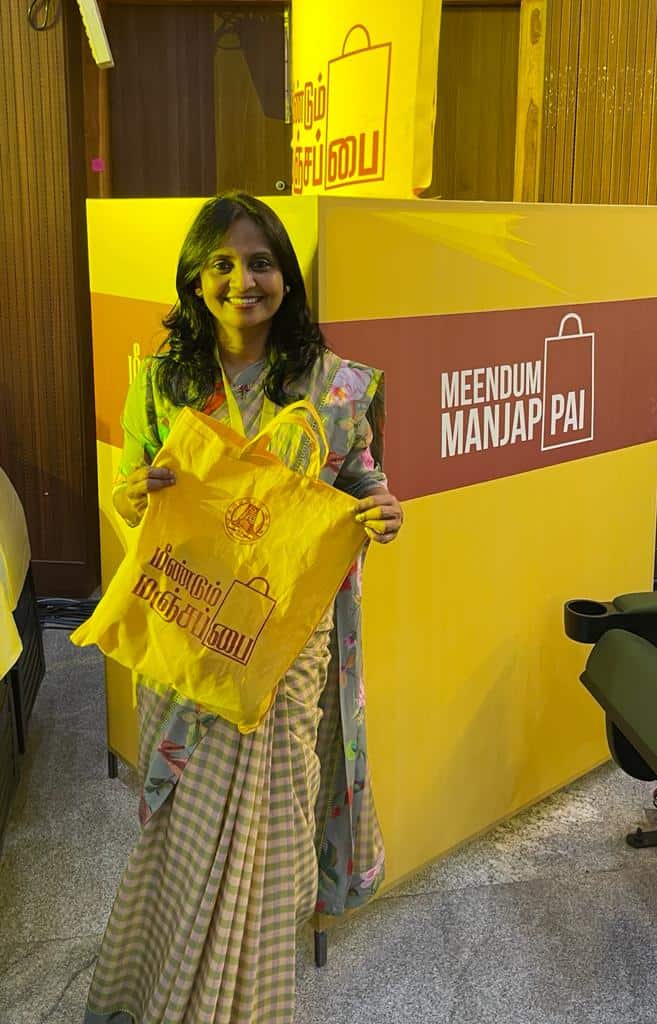“In order to do something beautiful for the future, you need to go back to the roots,” said a beaming Supriya Sahu, IAS and Additional Chief Secretary of Environment, Climate Change and Forests, Government of Tamil Nadu, as she spoke of the Meendum Manjapai Vizhipunarvu Iyakkam (Back To Yellow Cloth Bags) campaign of the state government. The campaign, which is spearheaded by the IAS officer, aims to motivate people to quit the use of plastic bags and go back to using the eco-friendly traditional yellow cloth bags, which were once widely used and popular in the state, especially during weddings.
Over the last few months, Chennai city has yet again started witnessing attempts to reduce the use of pollution caused by plastic, with the city’s famous Koyambedu market, said to be Asia’s largest wholesale fruits and vegetables market, deciding to stop the use of disposable plastic bags altogether.
The Tamil Nadu government in 2019, had actually imposed a ban on 14 plastic items including single use plastic and polythene. However, the outbreak of COVID-19 in 2020 and the resulting lockdown made it difficult for the ban to be implemented effectively and efficiently, which saw the banned items being widely used in the state. So will the new yellow cloth bag campaign achieve what the earlier ban could not?
Read more: Two years since the ban, plastic is back in a big way. Is COVID the real reason?
Citizen Matters caught up with Supriya Sahu in her office at the State Secretariat for a brief interaction during which she spoke about the implementation of the plastic ban, the need for a change in mindset of the citizens regarding plastic use and of course, Manjappai!
Here are excerpts of the conversation:
Despite a ban in 2019, single-use plastic is making a comeback and is now seen everywhere, especially after the pandemic. What do you think was lacking in terms of implementation?
I would like to go back to the experiences we have had in the past. Experiences across the globe tell us that if you try to impose something only through a government action or order, where people are not involved, then those initiatives do not succeed to a great extent. Because ultimately, in order to make anything successful, especially something like this that relates to the entire social arena, you have to get citizens involved. What had been happening so far is that concerned officials would go and close down the shops violating the ban, seize the materials and leave. But once they left, the shops would again begin to use plastic.
So while implementation of the ban is important, it is equally important to bring a change in the way the citizens look at the entire initiative. If people think that it’s only something that the government is driving and that it’s only regulatory, it’s not going to succeed. If they see a value in what’s being mandated and understand that it’s also good for them and their future, it’s bound to make an impact.
How do you plan to bring about this change in the mindset of the citizens?
We understood that there is a need to come up with something that catches the imagination of the people. And it shouldn’t be preachy. Citizens, especially the younger generation, do not like to be lectured. So we decided to come up with something which is connected to our value system. That’s how Manjapai happened. Manjapai is like a metaphor that links you to your past and it also has a cute and ‘retro-cool’ aspect to it. We are also trying to spread awareness about the fact that we are doing this in order to hand over a better planet to our future generations. And I’m hopeful that these ideas will resonate with the younger generation, especially the children, more than the adult population.
Can you tell us a bit more about the Manjapai campaign in particular?
Manjapai was an integral part of Tamil Nadu’s culture and tradition. Back in the day, if you attended any weddings, you would get these beautiful yellow cloth bags, which were dyed in turmeric, which actually gave it the yellow colour. They would have the “namaste/vanakkam” sign on the bags and inside there would be a coconut, betel leaf and other auspicious items. So we decided to come up with an initiative that would connect with this beautiful eco-friendly tradition. So, in a way, we are also going back to our roots by stopping the use of plastic.
At the moment, we do not have any control over the manufacturing or hold any copyrights over its design or anything. Anybody who wishes to make these are free to do so. We are coming out with an online merchandise store on the Tamil Nadu Pollution Control Board (TNPCB) website where we will popularise lunchboxes, sling bags, cross body bags. There is also a manjapai group in the secretariat, which is headed by me, which keeps on ideating about all this.
When it comes to discussion on banning single use plastic, one concern that is frequently voiced is over the availability of affordable alternatives, especially among small time traders. How would you address these concerns?
What used to happen 20 years back ? There was no plastic back then. We lived well and we lived better. This is because people used to carry their own bags. Manjapai is basically a metaphor. It is an idea whose time has come. What we are trying to tell people is, why can’t you carry your own bag? Why can’t you carry your own bottle? Why do you have to be a slave to a plastic bottle? Today, if you go to the Nilgiris, there are no plastic bottles there. How are people managing there? They carry their own bottles or get water from common sources.
Read more: Zero-waste packaging: Help CAG build a list of shops that avoid plastic
Many of the countries abroad have already banned plastic and many are in the process of banning it. If you look at the United Kingdom, it has very strict enforcement on recyclable plastic. So why is it that we can’t do it? Everytime, we try to bring about a positive change, there is a lot of hue and cry.
As far as alternatives are concerned, there are plenty. It’s just that the plastic lobby is very strong. In UP, Bihar or MP, drinking tea or water in kulhads was so common at one point of time, but with the advent of plastic cups and bottles, people largely took to those. That is also because the big companies had a stake in it and took over. As a result, many who were earlier associated with making or selling the earthen cups and pots went out of business. If you look for alternatives, you will find them but we’re deliberately not looking at that.
Will any changes be made in the way the ban is being implemented?
We have to basically have a multi-pronged strategy. For that, we must first focus on bringing about behavioural changes. We must remind the citizens about their culture, remind them that you cannot choke your own planet, because you would be depriving your children of a good future then. By 2030 or 2050, If there is more plastic in the oceans than the fishes, what kind of a planet are we handing over to our children ? So you appeal to the people at that level. We are working a lot with the eco groups, students and student ambassadors and reaching out to all stakeholders.
As far as enforcement is concerned, we are working with the local bodies. In Chennai, the Greater Chennai Corporation is the implementing body. They have been seizing plastic items from shops and other institutions regularly.
Any fines or penalty if found to be violating the ban?
The first time penalty for storage, supply, transport, sale and distribution of throw away plastic is Rs 25,000. For the second time, it’s Rs 50,000 and Rs 1 lakh for the third time.
On December 1st, there was a raid in Chennai, during which 4,816 trades spread across the 15 zones in the city were inspected. A total fine of Rs 3,73,000 was imposed that day and 1,233 kg of banned plastic items were seized.
What would you want to tell the people of Chennai regarding the use of single use plastic?
See, I don’t think there is any need for anybody to tell the people of Chennai about the ill effects of plastic. They are seeing it everyday. In the recent floods, they have seen enough – how their drains were clogged with plastic and how the water bodies were choked. Chennai is such a beautiful place. So if we want to avoid any kind of devastation and want to go back to the beautiful past that we had, it is important that we stop using any kind of banned items and switch to alternatives like cloth bags. Switch to Manjapai! (smiles).

